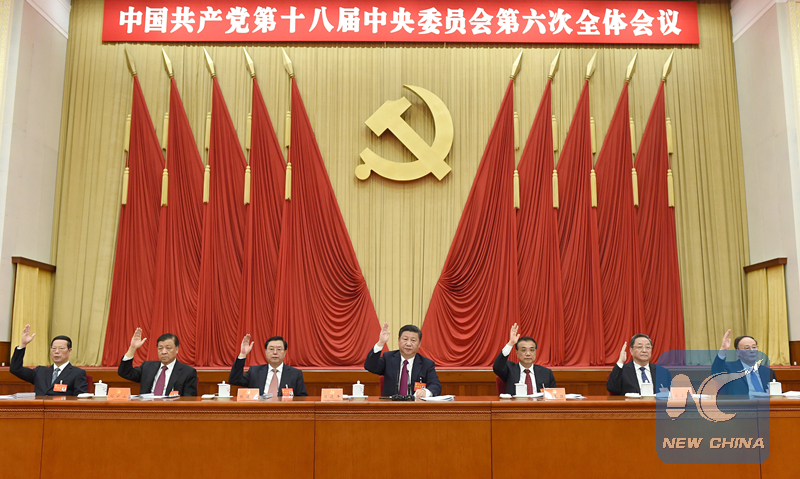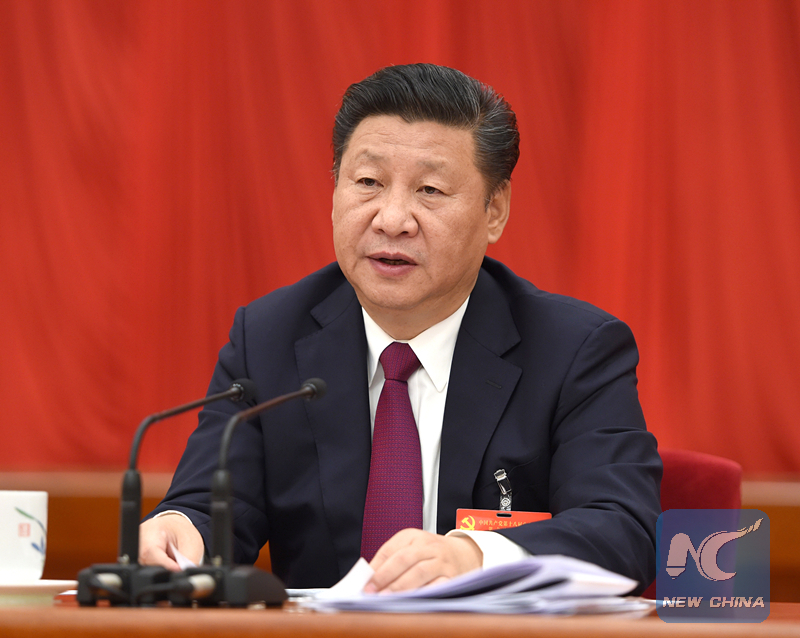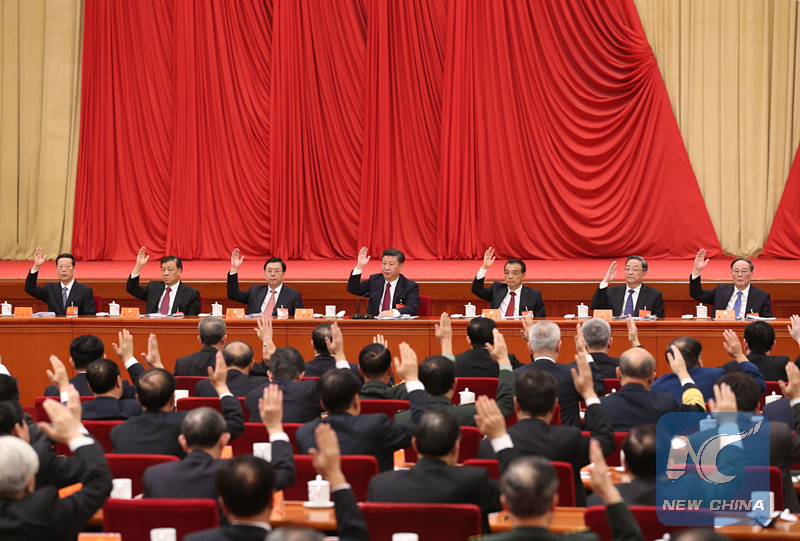
Top Communist Party of China (CPC) and state leaders Xi Jinping (C), Li Keqiang (3rd R), Zhang Dejiang (3rd L), Yu Zhengsheng (2nd R), Liu Yunshan (2nd L), Wang Qishan (1st R) and Zhang Gaoli (1st L) attend the Sixth Plenary Session of the 18th CPC Central Committee, in Beijing. The meeting was held from Oct. 24 to 27 in Beijing. (Xinhua/Li Xueren)
BEIJING, Oct. 29 (Xinhua) -- The leaders of the Communist Party of China (CPC) approved two documents on discipline of the Party at a meeting which concluded on Thursday.
According to a communique following the four-day meeting, the documents approved at the sixth plenary session of the 18th CPC Central Committee include:
- the norms of political life within the Party in a new situation
- a regulation on intra-Party supervision
The communique also include many other outcomes of the plenum. Here are 10 things you need to know about the communique.

Chinese President Xi Jinping, also general secretary of the CPC Central Committee, speaks at the Sixth Plenary Session of the 18th CPC Central Committee, in Beijing. (Xinhua/Li Xueren)
1. Strict governance of the Party
Party members were told to resolutely push forward the comprehensive and strict governance of the Party.
Each plenary session during the five-year tenure of Central Committee members has a specific agenda. Deepening reform, advancing rule of law, and building an all-around moderately prosperous society were the focus of the third, fourth and fifth plenary sessions of the 18th Central Committee.
Strict governance of the Party was the focus of the sixth plenary session, which means the "Four Comprehensives," the strategic outline and key thoughts of CPC Central Committee members, will be gradually perfected, said Xie Chuntao, a professor with the Party School of the CPC Central Committee.
The "Four Comprehensives" strategy refers to comprehensively completing the building of a moderately prosperous society, deepening reform, advancing the rule of law and strictly governing the CPC.
2. Core leadership
Party members were called on to "closely unite around the CPC Central Committee with Comrade Xi Jinping as the core."
It urged party members to resolutely safeguard the authority of the CPC Central Committee and its central, unified leadership.
"The call is conducive to establishing the authority of the CPC Central Committee, increasing solidarity within the Party, and enhancing cohesion and fighting capacity," said Xin Ming, a professor with the Party School of the CPC Central Committee.
The CPC Central Committee with Comrade Xi Jinping as the core reflects the common aspiration of people from all ethnic groups in China, he said.
Since Xi took charge of the CPC in late 2012, the Party has made profound achievements in reform, development, stability, internal and foreign affairs, national defense, Party governance and state administration.
The reason the CPC has always been endorsed by the public and won victory in revolutionary struggles lies in its core of strong leadership, which leads the Party and people, Xin said.
3. Political life within the Party
An overhaul of intra-Party political life was a pressing task for the CPC if it was to weather the storm of challenges -- ruling status, reform and opening up, market economy and other external factors -- it had to address the dangers of rocking the boat, including slacking officials, incompetence, isolation from the people and corruption.
Professor Xin Ming said standardized intra-Party political life is fundamental to comprehensive and strict Party governance.
In 1980, the CPC introduced a document outlining the norms of intra-Party political life, targeting serious events in the Party's history, such as the poor implementation of collective leadership, democratic centralism and intra-Party criticism.
However, Xin said that the world, the country and the Party have changed during the past three decades, bringing a need for new criteria.
The changes highlight principles such as maintaining close ties with the people, criticism and self-criticism, democratic centralism, and intra-Party democracy.
These norms set criteria to address problems in Party political life, such as not taking political life seriously and attempting to form cliques, Xin said.
4. Intra-Party supervision
The CPC needs to be empowered to purify, perfect, reform and upgrade itself, resist corruption and withstand risks, thus, safeguarding the authority of the CPC Central Committee and the Party's unity, advancement and purity.
Supervision was one of the keywords at the session, appearing in the communique over 40 times.
Li Yongzhong, former deputy head of the Chinese Discipline Inspection Institute, said the new regulation was a tool for intra-Party supervision, and the inspection of Party committees, as well as encouraging the public to take part in the anti-graft drive.
5. Strict Party discipline
Unrestricted power or unsupervised Party members are not allowed to exist within the CPC: "No prohibited zone or exception will be allowed in intra-Party supervision."
"To forge iron, one must be strong," said Dai Yanjun, a professor with the Party School of the CPC Central Committee, citing a Chinese proverb to underline the importance of Party discipline.
The CPC Central Committee has been stressing discipline to prevent slackness in Party building and governance, he said.

Top CPC and state leaders Xi Jinping (C rear), Li Keqiang (3rd R, rear), Zhang Dejiang (3rd L, rear), Yu Zhengsheng (2nd R, rear), Liu Yunshan (2nd L, rear), Wang Qishan (1st R, rear ) and Zhang Gaoli (1st L, rear) attend the Sixth Plenary Session of the 18th CPC Central Committee, in Beijing. (Xinhua/Pang Xinglei)
6. Intra-Party democracy
Intra-Party democracy is vital to the Party, and is fundamental to a positive, healthy internal political environment, according to the communique.
Professor Xin Ming said that intra-Party democracy is weak in some areas, for example, when certain individuals impose their will in recruitment, investment decisions and the use of funds.
In order to maintain long-term rule, the CPC must ensure the democratic rights of all members and make sure their voices are heard, he added.
7. Anti-corruption
There will no longer be any place for corrupt officials to hide in the Party, said the communique. The Party will stick to the policy of "no restricted zones, full coverage and zero tolerance" in its fight against corruption, it added.
It shows the Party's resolve to combat corruption and there will be no stopping it, said Professor Xie Chuntao.
The anti-graft campaign has seen remarkable results, and now we must maintain the momentum to guarantee that officials dare not, cannot and do not want to be corrupt, he added.
8. Leading officials
In efforts to clean up Party politics, leading officials are banned from using their positions to seek benefits for friends and family. Family members and friends of leading officials will be banned from interfering in the work of leading officials, including personnel arrangements, the communique said.
Leading officials are the key when regulating intra-Party political life, said Professor Xie. This group should always remain vigilant, and restrain themselves, their family members and their friends, he added.
9. Supervision of power
The communique also noted that supervision is fundamental in the correct operation of political power, and important in strengthening and regulating political life. It said that power without restrictions should never exist in the Party.
Li Yongzhong said that excessive centralized power and power abuse would lead to privilege and corruption. Therefore, keeping power under control and improving the supervision of power is a must for the Party.
10. Selection of officials
The CPC promised to address electoral malpractice, putting an end to the buying and selling of official posts and vote rigging, while stressing integrity in promotions.
"The crux of the quest for a clean and healthy intra-Party political environment is selecting officials," said Wang Yukai, a professor with the Chinese Academy of Governance.
On the one hand, misbehavior must be curbed and seriously dealt with; on the other hand, officials who take on challenges and responsibilities that others evade should be encouraged, Wang said.
A system should be created that tolerate mistakes made by officials who pursue reform and innovation, Wang added.

